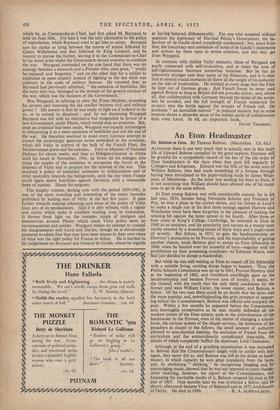An Eton Headmaster
Dr. Balston at Eton. By Thomas Balston. (Macmillan. 12s. 6d.)
ALTHOUGH there is not very much that is actually new in this short life of Edward Balston compiled by his great-nephew, Etonians will be grateful for a sympathetic record of the last of the old order of Eton headmasters in the days when that post fell regularly to Collegers and Kingsmen. Edward was the fifth of the seven sons of William Balston, who had made something of a fortune through having been introduced to the paper-making trade by James What- man, of Maidstone. As the latter was sending his boys to Eton, it is not surprising that William should have allowed one of his many sons to go to the same school.
At Eton young Balston met with considerable success, for in his last year, 1836, besides being Newcastle Scholar and President of Pop, he won a place in the cricket eleven, and his failure at Lord's to make a single run in his first three innings against Harrow and Winchester must have been forgotten in the pleasure of making the winning hit against the latter school in his fourth. After three or four years at King's College, Cambridge, he returned to Eton in 1840 as an assistant, and his popularity and success as a master were visibly attested by a boarding-house of thirty boys and a pupil-room of seventy. But failure, in 1853, to gain the headmastership on Hawtrey's promotion to be Provost, and the improbability of getting another chance, made Balston glad to accept an Eton fellowship in 1860, when he handed over his houseful of boys—together with his prohibition on their possessing armchairs—to Edmond Warre, who had just decided to accept a mastership.
But while he was still waiting at Eton to round off. his fellowship with a suitable living, exciting things began to happen. Thus, the Public Schools Commission was set up in 1861, Provost Hawtrey died at the beginning of 1862, and Goodford unwillingly ga,ve up the headmastership and became Provost (out of loyalty, it seems, to the Queenl, with the result that the only likely candidates for the former• post were William Carter, the lower master, and Balston, a fellow. Of the two men there could be no doubt that the latter was the more popular, and, notwithstanding the grim prospect of appear- ing before the Commissioners, Balston was offered and accepted the post. Within a few months he appeared before the Commission, and, thoroughly conservative as he was, stoutly defended all the weakest points of the Eton system, such as the subordination of the headmaster to the Provost, even in the matter of changing a school- book, the curious system of the chapel services, the limitation of the preachers in chapel to the fellows, the small amount of authority allowed to non-classical masters, the exclusion of French from the curriculum and the extraordinarily complicated time-table, the details of which completely baffled the chairman, Lord Clarendon.
Although at the end of a gruelling examination it was intimated to Balston that the Commissioners might wish to confer with him again, they never did so, and Balston was left to his duties as head- master, in which capacity he won great popularity from the boys, and, by abolishing " shirking," by recognising beagling and by encouraging music, showed that he was not opposed to every change. After receiving, however, the report of the Commissioners, and foreseeing the inevitable results of it, Balston resigned his post at the end of 1867. Nine months later he was re-elected a fellow, and he shortly afterwards became Vicar of Bakewell and in 1873 Archdeacon


























































 Previous page
Previous page